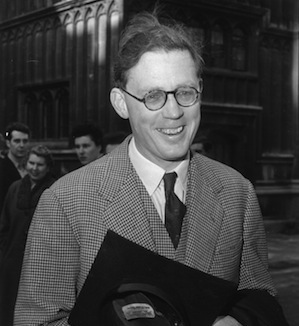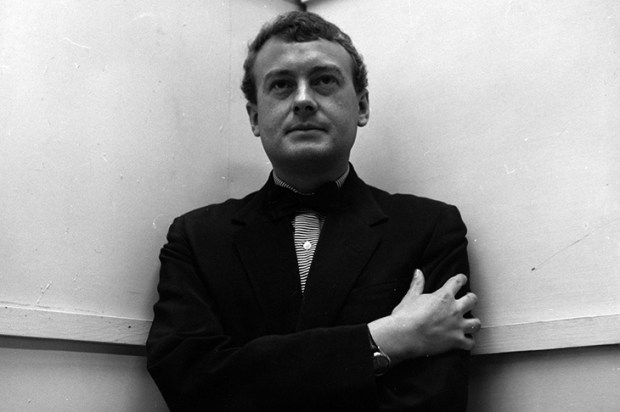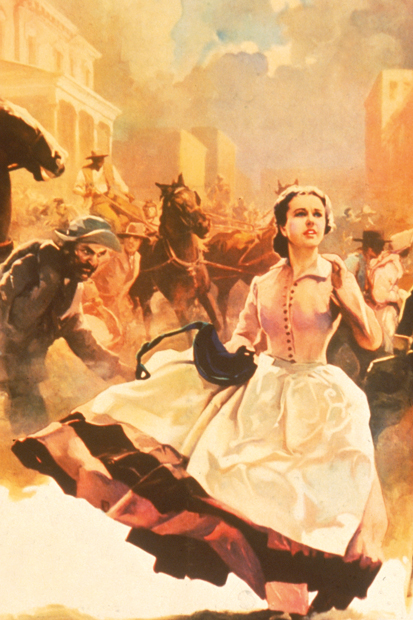The arrival of a letter from Hugh Trevor-Roper initiated a whole series of pleasures. Pleasure began with the very look of the envelope, addressed in his wonderfully clear, elegant hand (writing to Alasdair Palmer in 1986, he advised ‘No, don’t type your letters . . . reject the impersonality of the machine’; and towards the end of his life, when his sight was failing, it was a matter of particular regret that this ‘played havoc’ with his handwriting).
But the envelope was just the prelude to the contents, which could be relied on to be stylish, amusing, witty, imaginative and playful. Now, thanks to Richard Davenport-Hines and Adam Sisman, the joint editors of this well-judged selection of his correspondence, something of the pleasure of receiving a Trevor-Roper letter can be savoured by those who never knew him.
Only 100 letters from Hugh Trevor-Roper, then: but the editors have chosen well, and their florilegium displays the man across the length of his adult life (the first letter is to Logan Pearsall Smith in 1943,the last to Nicholas Henderson in 2001), and in correspondence with a wide range of people: with close family, with friends of long standing, and also with a younger generation of scholars whom he befriended in old age.
We also are given him writing on a range of topics. To those who knew him not at all, or at least only through his public reputation towards the end of his career, it will perhaps be those letters in which he expresses his delight in the natural world that will be most surprising. Here Trevor-Roper’s taste was formed by the county of his birth, Northumberland, which instilled in him a preference for the more austere forms of beauty in landscape — hence his preference for Greece over Italy. But austerity was not a good in itself. The deserts of the American West, for instance, did not please him: ‘We are not greatly enjoying our visit to Boulder. It is a dull place which makes Didcot seem exciting’; ‘We left California on New Year’s Eve. I was glad to leave it. It is an unreal place, with an unreal climate’ — these are characteristic comments.
Public life and academic politics naturally predominate. Indeed, with less vigilant editors these topics might have swamped the volume. The severity of selection was no doubt right, but it has produced some regrettable casualties. For instance, to have allowed the hilarious letter Trevor-Roper wrote to the Yale historian Wallace Notestein about the election of Harold Macmillan as Chancellor of Oxford to slip back into obscurity must have caused a pang. The faint consolation is that it can, apparently, be consulted in the Beinecke Library (Trevor-Roper was alarmed to discover that items of his correspondence had been given to university libraries, and so might beread by the general public, including those about whom he may have been colourfully indiscreet).
However, if those comic letters mocking donnish folly made way for the more personal letters Trevor-Roper wrote to his wife, Xandra, and to his stepson, James Howard-Johnston, then the decision was right. These more intimate letters show his capacity for emotion, and his willingness to bestow kindly wisdom. They should usefully complicate his image in the public mind.
The great joke about Trevor-Roper’s election as Master of Peterhouse is that Maurice Cowling and his hangers-on thought they were getting a Tory, whereas in fact they got a Whig — even, as Trevor-Roper said to his stepson, emphatically but not entirely unparadoxically, ‘an uncompromising Whig’. Trevor-Roper’s outlook was liberal in the best sense. Nonconformity was a good thing, not because of the private doctrines that sects tend to generate and then hug to themselves, but rather because of its overall benign impact on social life. Nonconformity was to be encouraged
in order that society may be fragmented and articulated and sophisticated and self-governing and responsible, and lest one good custom should corrupt the world. I hate uniformity, which only leads to mass culture, intellectual banality and the political instability of huge, mindless electorates and demagogic rulers . . .
Unsurprisingly, then, Trevor-Roper’s opinions remained supple until the end. For instance, the coincidence of reading Michael Bloch’s book on the Duke of Windsor shortly after demitting as Master of Peterhouse provoked a complicated spasm of revisionary whimsy, which he related to Alasdair Palmer:
It is a fascinating but horrible story. I now see that there is a good deal to be said for a Republic. I fear that in my old age I am becoming very radical. After Peterhouse I doubt the value of the college system, and after Bloch of the monarchical system; but I must overcome these doubts.
But what did not change, even when he was widowed and afflicted with ill-health, was Trevor-Roper’s gaiety, his wit and his buoyant high spirits. Whether in his extremely funny (but also very perceptive) character sketch of A.L. Rowse, written as an impeccable pastiche of a brief life by John Aubrey, or in his mischievous desire to smuggle a manuscript into the Bodleian apparently supportive of the delusion that the plays of Shakespeare were written by Francis Bacon, or by the earls of Pembroke and Oxford, or possibly by all three — ‘I like to think of a devout American D.Phil. student discovering this and sending it in triumph to the Times Lit. Supplement’ — Trevor-Roper’s determination not to acquiesce in drabness, but to wrench it violently if need be in the direction of amusement and energy, was one of his ruling passions. In this collection of letters that excellent and necessary disposition seems to live again.
Got something to add? Join the discussion and comment below.
Get 10 issues for just $10
Subscribe to The Spectator Australia today for the next 10 magazine issues, plus full online access, for just $10.
Available from the Spectator Bookshop, £20.00. Tel: 08430 600033
You might disagree with half of it, but you’ll enjoy reading all of it. Try your first month for free, then just $2 a week for the remainder of your first year.














Comments
Don't miss out
Join the conversation with other Spectator Australia readers. Subscribe to leave a comment.
SUBSCRIBEAlready a subscriber? Log in